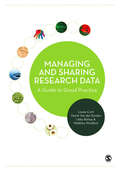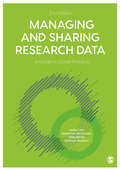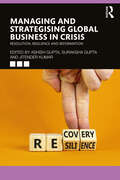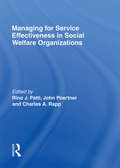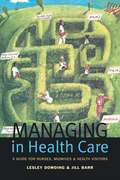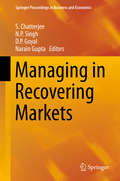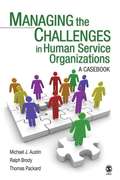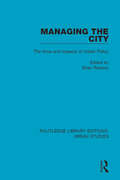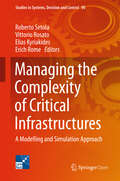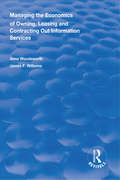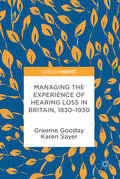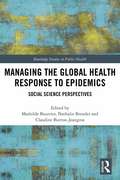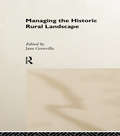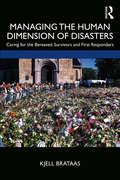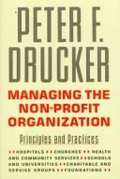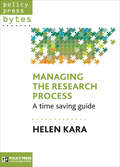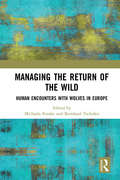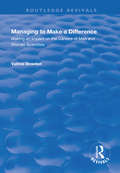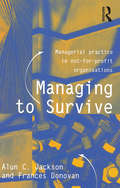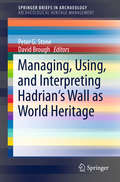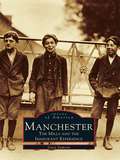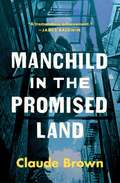- Table View
- List View
Managing and Sharing Research Data: A Guide to Good Practice
by Matthew Woollard Libby Bishop Louise Corti Veerle Van den EyndenResearch funders in the UK, USA and across Europe are implementing data management and sharing policies to maximize openness of data, transparency and accountability of the research they support. Written by experts from the UK Data Archive with over 20 years experience, this book gives post-graduate students, researchers and research support staff the data management skills required in today's changing research environment. The book features guidance on: how to plan your research using a data management checklist how to format and organize data how to store and transfer data research ethics and privacy in data sharing and intellectual property rights data strategies for collaborative research how to publish and cite data how to make use of other people's research data, illustrated with six real-life case studies of data use.
Managing and Sharing Research Data: A Guide to Good Practice
by Matthew Woollard Libby Bishop Louise Corti Veerle Van den EyndenWritten by experts at the UK Data Archive, with over thirty years of experience in working with and teaching people to work with data, this book is the globally-reaching guide for any postgraduate student or researcher looking to build their data management skills. Focused on both primary and secondary data and packed with checklists and templates, it contains everything readers need to know for managing all types data before, during, and after the research process. Building on foundational data management techniques, it offers practical advice and insight into the unique skills needed to work with newer forms of data, like social media and big data. It also demonstrates how to: - Identify quality data that is credible, ethically-sound, and available for use - Choose and collect data suitable for particular research questions and project scopes - Work with personal, communal, administrative, and other sensitive and public data - Make the most of metadata - Visualise and share data using innovative platforms like blogs, infographics, and podcasts.
Managing and Sharing Research Data: A Guide to Good Practice
by Matthew Woollard Libby Bishop Louise Corti Veerle Van den EyndenWritten by experts at the UK Data Archive, with over thirty years of experience in working with and teaching people to work with data, this book is the globally-reaching guide for any postgraduate student or researcher looking to build their data management skills. Focused on both primary and secondary data and packed with checklists and templates, it contains everything readers need to know for managing all types data before, during, and after the research process. Building on foundational data management techniques, it offers practical advice and insight into the unique skills needed to work with newer forms of data, like social media and big data. It also demonstrates how to: - Identify quality data that is credible, ethically-sound, and available for use - Choose and collect data suitable for particular research questions and project scopes - Work with personal, communal, administrative, and other sensitive and public data - Make the most of metadata - Visualise and share data using innovative platforms like blogs, infographics, and podcasts.
Managing and Strategising Global Business in Crisis: Resolution, Resilience and Reformation
by Ashish Gupta Suraksha Gupta Jitender KumarGlobal business has been affected by several unprecedented and significant problems and threats in the recent past. This book offers comprehensive strategies for managing crises and disruptions to reinvigorate productivity and performance. It discusses themes and issues like crisis management; consumer behaviour during crisis; emerging business models and trends in global business; and risks, impacts and mitigation strategies. The book provides an overview of business processes highlighting the unique challenges that the COVID-19 pandemic and other recent developments have wrought on businesses including disruptions in supply chains, health and safety risks for employees and economic and logistical vulnerabilities, among others. Including case studies from various sectors and industries, the chapters in this book provide solutions and interventions like adopting technological improvements and innovative labour practices for organisations to deal effectively with uncertainty and adapt sustainable and effective models for growth and performance for their businesses. Lucid and topical, this book will be useful for scholars and researchers of business management, crisis management, finance and economics, as well as for business and corporate professionals.
Managing for Service Effectiveness in Social Welfare Organizations
by John Poertner Rino J Patti Charles A RappThis important book is the first to make an explicit link between management practices and service outcomes in social welfare agencies. Managing for Service Effectiveness in Social Welfare Organizations is based on the premise that the primary responsibility and distinctive competency of social welfare management is delivering high quality, effective services to clients. Collectively, the book’s esteemed contributors have clearly presented a model of administration founded on concepts and strategies for connecting managerial action with service effectiveness. The sections of the book correspond to the core functions and tasks in an effective approach to management, including measuring performance, program and organizational design, managing people, managing information, managing environmental relations, and the ethics of managing for effectiveness.
Managing in Health Care: A Guide for Nurses, Midwives and Health Visitors
by Jill Barr Lesley DowdingAppropriate for health administrators in departments of sociology, social policy and nursing.Students in pre-registration programmes and those meeting management theory for the first time. There can be little doubt that the reforms of the last few decades within the health service have had a major impact on the management responsibilities for nurses, midwives and health visitors. Integrating management theory and principles with nursing practice, Managing in the Healthcare demonstrates how the concepts and principles of management are intrisically linked to the work that nurses do.
Managing in Recovering Markets
by S. Chatterjee N. P. Singh D. P. Goyal Narain GuptaThe changing dynamics of business worldwide have led organizations to look beyond traditional managerial practices while at the same time attempting to retain their core competitive advantages. This development has called upon academicians and practitioners alike to reassess the different aspects of business management such as macroeconomic variables, the nature of the market, the changing features of the workplace, the new work ethos, and/or employer-employee exchanges. In this context, the book provides essential insights on industry innovations, academic advances and policy movements with regard to recovering markets in India and around the globe. The individual papers highlight potential avenues that could allow industry to better understand and respond to the global crisis. The book collects research papers presented at the Global Conference on Managing in Recovering Markets (GCMRM), held in March 2014. Seven international and 120 national business schools and management universities were represented at the conference, the first in a series of 13 planned under the GCMRM agenda for 2014-17. The book includes more than 30 research papers chosen from a pool of 118 presented at the conference, all of which have undergone a rigorous blind review process.
Managing the Challenges in Human Service Organizations: A Casebook
by Ralph Brody Michael J. Austin Thomas PackardManaging the Challenges in Human Service Organizations: A Casebook offers current and aspiring human service managers a view into the kinds of experiences they will likely encounter to better prepare them for the world they are about to enter. The cases are inspired by real situations and are designed to encourage students to determine how they would act and work towards a resolution of the dilemmas presented. Key Features Simulates administrative dilemmas through cases that offer different aspects of agency administration and replicate aspects of actual practice Levels the learning field for students entering graduate human service management programs with different managerial experiences Orients students to the challenges of management by helping them develop mental models linked to the values of client-centered administration Helps students develop a beginning sense of competence and understanding of managerial work while refining their analytic skills Offers the opportunity for repeated learning opportunities using different analytical frameworks Supplements fieldwork by providing more time to reflect and consider a broader array of alternatives than is found in most field experiences Intended Audience This book is ideally suited as a supplemental text for advanced undergraduate and graduate courses in social work and counseling, as well as a much-needed reference for human services supervisors and practitioners.
Managing the City: The Aims and Impacts of Urban Policy (Routledge Library Editions: Urban Studies #20)
by Brian RobsonThis book, first published in 1987, addresses questions which have gained new importance in the light of the continuing erosion of the economic base and social stability of cities. The recurring riots in inner cities are but the outward manifestation of the profound collapse of the civic societies of our cities. This book addresses three main issues: What has gone wrong? What successes and failures have changes in policy had? And what should be the shape of future urban policy? This book will be interest to students of sociology, urban studies and human geography.
Managing the Complexity of Critical Infrastructures
by Elias Kyriakides Erich Rome Roberto Setola Vittorio RosatoThis book is open access under a CC BY 4. 0 license. This book summarizes work being pursued in the context of the CIPRNet (Critical Infrastructure Preparedness and Resilience Research Network) research project, co-funded by the European Union under the Seventh Framework Programme (FP7). The project is intended to provide concrete and on-going support to the Critical Infrastructure Protection (CIP) research communities, enhancing their preparedness for CI-related emergencies, while also providing expertise and technologies for other stakeholders to promote their understanding and mitigation of the consequences of CI disruptions, leading to enhanced resilience. The book collects the tutorial material developed by the authors for several courses on the modelling, simulation and analysis of CIs, representing extensive and integrated CIP expertise. It will help CI stakeholders, CI operators and civil protection authorities understand the complex system of CIs, and help them adapt to these changes and threats in order to be as prepared as possible for mitigating emergencies and crises affecting or arising from CIs.
Managing the Economics of Owning, Leasing and Contracting Out Information Services (Routledge Revivals)
by Anne Woodsworth James F. Williams IIFirst published in 1993, the purpose of this book is to identify and describe the most important factors that must be considered in making decisions about the optimal ways to provide access to information – in short, the best way to use the humans, the machines, and the intangible resources known as information, particularly at the organizational level. In recent years executives have begun to outsource computing and telecommunications functions, primarily to control costs. Traditional libraries and information centres have been disbanded in favour of service contracts or outright leasing of staff. Both the public and private sectors are examining their information service operations from the point of view of cost effectiveness. Decisions about owning versus leasing of information are being made daily. Decision-makers are finding that they must deal differently with funding and budgeting of information systems and libraries from their earlier practice. New paradigms for these service functions already exist. Not only have corporations and governments begun to contract out entire information service operations, but libraries themselves have begun to consider the costs, effectiveness, and implications of outsourcing some of their operations and services. This book provides a framework for decision-makers to view and review information services within their organizations. Entire units, components of libraries and information centres are defined and untangled so that the widest variety of organizations can analyse their own environments. Each chapter is accompanied by comments from a broad range of experts in the information field.
Managing the Experience of Hearing Loss in Britain, 1830–1930
by Graeme Gooday Karen SayerThis book looks at how hearing loss among adults was experienced, viewed and treated in Britain before the National Health Service. We explore the changing status of ‘hard of hearing’ people during the nineteenth century as categorized among diverse and changing categories of ‘deafness’. Then we explore the advisory literature for managing hearing loss, and techniques for communicating with hearing aids, lip-reading and correspondence networks. From surveying the commercial selling and daily use of hearing aids, we see how adverse developments in eugenics prompted otologists to focus primarily on the prevention of deafness. The final chapter shows how hearing loss among First World War combatants prompted hearing specialists to take a more supportive approach, while it fell to the National Institute for the Deaf, formed in 1924, to defend hard of hearing people against unscrupulous hearing aid vendors. This book is suitable for both academic audiences and the general reading public. All royalties from sale of this book will be given to Action on Hearing Loss and the National Deaf Children’s Society.
Managing the Global Health Response to Epidemics: Social science perspectives
by Mathilde Bourrier Claudine Burton-Jeangros Nathalie BrenderRecent epidemics have prompted large-scale international interventions, aimed at mitigating the spread of disease in a globalized world. During a crisis, however, global health actions – including planning and organizing, communicating about risk, and cost–benefit evaluations – aren’t usually part of a single, integrated global response. Arguing that an uncoordinated approach can be challenged by local conditions and expectations, generating a wide range of resistance and difficulties, this volume provides important insights for future outbreak management and global health governance. Drawing on experiences with A(H1N1) and Ebola virus disease, the book is divided into three parts looking at how responses to global health crises have developed, lessons learned from particular pandemics and the ethical implications of our management of them. Individual chapters focus on, among other issues, financing, cost–benefit analysis, matrix management, risk communication and organizational strategies. Taking a social science perspective, this valuable book outlines the current state of global health emergency responses and explores ways in which they can be improved. It is a useful read for academics and practitioners interested in global health, the sociology of health and illness, health economics and emergency management.
Managing the Historic Rural Landscape (Issues in Heritage Management)
by Jane GrenvilleFirst published in 1999. Routledge is an imprint of Taylor & Francis, an informa company.
Managing the Human Dimension of Disasters: Caring for the Bereaved, Survivors and First Responders
by Kjell BrataasManaging the Human Dimension of Disasters provides the most comprehensive and up-to-date analysis on how individuals cope with tragedy and loss. Kjell Brataas gives a voice to those who have suffered and have been affected by unimaginable trauma. Noted experts recount stories and share their knowledge of how they assisted victims following tragedies such as the Manchester Arena bombing, the 2004 Indian Ocean tsunami, terror attacks, several aircraft disasters and school shootings, the 9/11 attacks and the COVID-19 pandemic. The book focuses on those affected by a disaster, including the bereaved, survivors and first responders. Leaders of support groups formed after these tragedies, trauma therapists and psychologists from three continents offer their experiences dealing with victims and the aftermath of disaster. Chapters provide guidance on memorializing tragedies, site visits, donation management, media relations, social media, grief counseling and human resilience. Readers will be shown that psychological support is critical after a disaster and learn from those who deal with emergencies. Brataas’ unmatched volume offers new understandings, recommendations, best practices and benchmarks on how best to assist victims in the aftermath of disaster. A valuable resource for students, researchers and practitioners.
Managing the Non-Profit Organization: Practices and Principles
by Peter DruckerThe service, or non-profit, sector of our society is growing rapidly (with more than 8 million employees and more than 80 million volunteers), creating a major need for guidelines and expert advice on how to manage these organizations effectively.
Managing the Research Process: A Time-Saving Guide
by Helen KaraHow-to books often treat research as if it exists in isolation. But in reality, people need to fit research in with all their other commitments. This e-book is full of practical hints and tips to show you how to manage research alongside work, family, and social life.
Managing the Return of the Wild: Human Encounters with Wolves in Europe
by Michaela FenskeThis book explores attitudes and strategies towards the return of the wild in times of ecological crisis, focusing on wolves in Europe. The contributions from a variety of disciplines discuss human encounters with wolves, engaging with traditional narratives and contemporary conflicts. Covering a range of geographical areas, the case studies featured demonstrate the tremendous impact of the return of the wolf in European societies. Wolves are a keystone species that exemplify humanity’s relation to what is called nature and their return generates powerful debates about what ‘nature’ actually is and how much it is needed or should be permitted to exist. The book considers the return of the wild as a catalyst for fundamental socio-biological changes of the world within human societies, and the various responses of humans to wolves demonstrate both our potential and limitations when it comes to multispecies communities and negotiating societal change. Managing the Return of the Wild will be relevant to a broad audience interested in discussions of social and ecological conflict today, including scholars from multispecies studies and diverse disciplines such as biology, forestry management and folklore studies.
Managing to Make a Difference: Making an Impact on the Careers of Men and Women Scientists (Routledge Revivals Ser.)
by Valmai BowdenThis title was first published in 2000: This work concerns the personnel and career management of scientists employed in four research settings: universities, government laboratories, research institutes and industrial laboratories. Its purpose is to describe and explain processes and practices, giving equal prominence to men and women in science. It explores the contexts in which the people (the scientific human resource) who are responsible for creating scientific knowledge carry out their work and build their careers. It draws on an empirical study of career management among research scientists in the four types of research setting and additional interest stems from issues concerning employment of "professional" staff at a time when organizations are undergoing enormous change.
Managing to Survive: Managerial practice in not-for-profit organisations
by Frances Donovan Alun C JacksonMost small not-for-profit organisations are under-resourced and under-skilled. Many are barely keeping their heads above water now the emphasis is on contracting out work in both the public and private sectors. Most are looking for help to cope with new demands for accountability and performance assessment. Managing to Survive outlines key strategies managers can take to not only survive but improve the service their organisation provides. Managing to Survive offers a broad introduction to the management issues faced by human service organisations, particularly small ones. It covers the basics of managing different roles and skills, staff and volunteer recruitment, training, maximising people's contribution, managing financial and physical resources and managing change. The approach is practical and the text is illustrated with real examples. Managing to Survive is an essential reference for students, Board members, managers and others working in the human services sector.
Managing, Using, and Interpreting Hadrian's Wall as World Heritage
by Peter G. Stone David BroughHadrian's Wall was inscribed as a World Heritage Site (WHS) in 1987 and, with the German Limes, became one of the first two parts of the transnational 'Frontiers of the Roman Empire' (FRE) WHS in 2005. The World Heritage Site of Hadrian's Wall is unusual, although not unique, among World Heritage sites in its scale and linear nature: stretching from Ravenglass on the west coast of England to Newcastle upon Tyne on the east coast - over 150 miles. Along its length it passes through two major urban centres and a variety of rural landscapes and its remains vary from substantial upstanding architectural features to invisible below ground archaeology. Traditionally many of the constituent parts of Hadrian's Wall, forts etc, have been managed as separate entities by different State and private organisations. These and other issues make it an extremely complex WHS to manage. This book not only chronicles the past management of the Wall but also looks towards the future as more countries aspire to have their Roman frontiers added to the FRE. The experience gained over the last two decades illustrates developments in the management of large scale complex heritage sites that will be of value as a detailed case study to those involved in (and affected by) heritage management, as well as academics, and students. Many of the issues raised will find resonance in those faced by many other large (World) heritage sites.
Manana Forever?
by Jorge G. CastanedaWhy are Mexicans so successful in individual sports, but deficient in team play? Why do Mexicans dislike living in skyscrapers? Why do Mexicans love to see themselves as victims, but also love victims? And why, though the Mexican people traditionally avoid conflict, is there so much violence in a country where many leaders have died by assassination? In this shrewd and fascinating book, the renowned scholar and former foreign minister Jorge Castañeda sheds much light on the puzzling paradoxes of his native country. Here's a nation of 110 million that has an ambivalent and complicated relationship with the United States yet is host to more American expatriates than any country in the world. Its people tend to resent foreigners yet have made the nation a hugely popular tourist destination. Mexican individualism and individual ties to the land reflect a desire to conserve the past and slow the route to uncertain modernity. Castañeda examines the future possibilities for Mexico as it becomes more diverse in its regional identities, socially more homogenous, its character and culture the instruments of change rather than sources of stagnation, its political system more open and democratic. Mañana Forever? is a compelling portrait of a nation at a crossroads.From the Hardcover edition.
Manana o pasado
by Jorge CastanedaEl rostro enigmático de México presenta hoy hondas cicatrices y un gesto que va del escepticismo a la ironía, del resentimiento al desprecio: ¿Cómo pueden descifrarse las inquietudes de ese rostro? ¿Qué estigmas conservan los mexicanos, a qué mitos se aferran? ¿Qué fracturas hay tras la guerra contra el narcotráfico, la vorágine migratoria y el descrédito de sus gobiernos, de sus aparatos de justicia y sus instituciones? Jorge Castañeda nos ofrece aquí el análisis más profundo que se ha hecho en los últimos años sobre el carácter de su país. Sustentado por un estudio riguroso de filósofos, historiadores, economistas y demás intelectuales que han expresado su fervor o contrariedad por México, así como por las reflexiones de extranjeros que han visto en ese país a una nación marcada por la hospitalidad o la barbarie, Castañeda nos advierte sobre las idiosincrasias de los mexicanos: la indiferencia a la competencia; la desgana a defender sus convicciones; el por qué se resisten a las acciones colectivas y a la participación comprometida en luchas políticas; de qué manera el descuido de la industria turística afecta su economía; y cómo el crecimiento de la clase media no es necesariamente una señal contundente de bienestar y confianza en los gobiernos. Por las deducciones implacables sobre la realidad moderna mexicana, afiladas por la ironía en la crítica y el reconocimiento de sus zonas más oscuras y dolorosas, Mañana o pasado es, sin duda, la obra imprescindible para entender el México contemporáneo.
Manchester: The Mills and the Immigrant Experience
by Gary SamsonThis fascinating and moving book brings to life the industrial and immigrant experience which gave birth to Manchester in the nineteenth century and continued to shape the city's destiny well into the twentieth century. More than a hundred years ago, thousands of immigrants from Europe and Canada were drawn to the mills of Manchester by the promise of a better life. In stirring photographs and text, Manchester: The Mill and the Immigrant Experience examines the aspirations, the struggles, and the everyday adventures of Manchester's immigrant families. Reaffirming the power of photography to move and inform us, Manchester: The Mills and the Immigrant Experience creates a vivid picture of life during nearly a century of rapid industrial change. We join the bustle of Elm and Hanover Streets in the 1880s, witness children working at the mighty Amoskeag Manufacturing Company, enter a Greek coffeehouse in the early 1900s, get caught up in the bitter labor strikes of the 1920s, and meet unusual local figures such as the Hermit of Mosquito Pond.
Manchild in the Promised Land
by Claude BrownWith more than two million copies in print, Manchild in the Promised Land is one of the most remarkable autobiographies of our time—the definitive account of African-American youth in Harlem of the 1940s and 1950s, and a seminal work of modern literature.Published during a literary era marked by the ascendance of black writers such as Richard Wright, Ralph Ellison, James Baldwin, and Alex Haley, this thinly fictionalized account of Claude Brown&’s childhood as a hardened, streetwise criminal trying to survive the toughest streets of Harlem has been heralded as the definitive account of everyday life for the first generation of African Americans raised in the Northern ghettos of the 1940s and 1950s. When the book was first published in 1965, it was praised for its realistic portrayal of Harlem—the children, young people, hardworking parents; the hustlers, drug dealers, prostitutes, and numbers runners; the police; the violence, sex, and humor. The book continues to resonate generations later, not only because of its fierce and dignified anger, not only because the struggles of urban youth are as deeply felt today as they were in Brown&’s time, but also because of its inspiring message. Now with an introduction by Nathan McCall, here is the story about the one who &“made it,&” the boy who kept landing on his feet and grew up to become a man.
